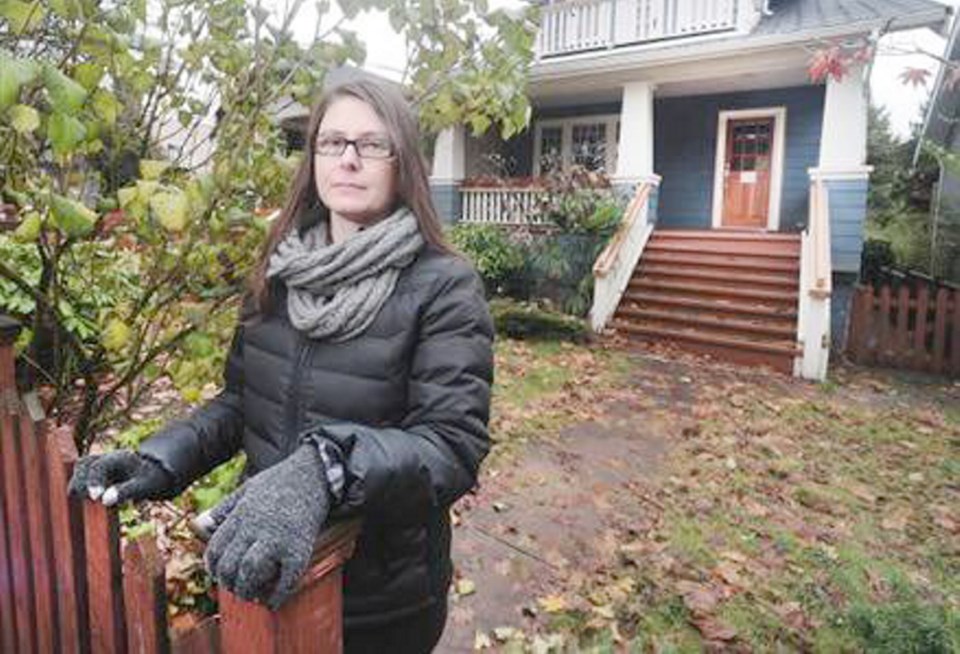Shelly Moffat doesn’t recognize her Kitsilano neighbourhood any more. The homes are empty. The streets are like investment portfolios. And Moffat believes that in this part of Vancouver families like hers are becoming historical artifacts.
Moffat, who has lived on a low income since her husband died 14 years ago, said that in April she and her two daughters were evicted from a rental home in the 3300-block West 6th Avenue. An international buyer wanted to renovate the home, which they had lived in since 2010, for personal use. Her family life was disrupted as she fought an abrupt eviction order and — like the majority of tenants in such cases — lost.
The home remains vacant in a scenario that reflects the escalating affordability crunch impacting Vancouver neighbourhoods.
Property records show that in 2000, the bungalow was sold for $428,000. In 2002 it sold for $700,000. In 2006 it sold again for $1.15 million. And finally, last April, it sold for $1.5 million.
Moffat said the traditional pool of rental homes in Kits has shrunk rapidly since 2010. With great effort last spring, she found a new rental home on West 23rd Street. But there are only about seven families living among 40 lots on the block. Moffat thinks this will be her last rental home in Vancouver.
“Do I live in a zombie neighbourhood?” she said. “I’m living with a bunch of empty houses, and for-sale signs, and construction sites. My kids have grown up in this neighbourhood, and my goal was to keep them here, and my community really supported me. It is very dystopian and sad.”
While Canada and Vancouver’s municipal government collect no data on foreign ownership, Moffat said the visible evidence around her is clear. This isn’t an issue of race, she said, but of investment, home usage, and communities being displaced.
“You literally can visibly see the international buyers and realtors cruising the street and taking down house numbers,” Moffat said.
“You are buying it as an investment to resell or tear down and rebuild. And when it’s built, often it is left empty. I’d say that it is policy that is allowing these houses to be vacant.
“I wish the people that are commoditizing these houses would have to rent them out instead, because then we could have people living in the neighbourhoods again.”
Moffat said she supported Vision Vancouver in the recent election and hopes Mayor Gregor Robertson’s government comes up with a plan to halt the hollowing out of the city. Single-family areas like Kits haven’t been studied yet, but reports on areas such as Coal Harbour have pointed to “zombie” neighbourhoods with 25 per cent of condos left empty.
COPE mayoral candidate Meena Wong campaigned on a promise to enforce vacancy fees on property owners — in efforts to increase rental home supply — telling The Province that previously affordable neighbourhoods such as Grandview Woodlands and Marpole are on track to turn into Coal Harbour-like areas.
Moffat said she thinks that even if the plan was instituted, most investors would simply pay vacancy fees. She said city council should look at bylaws that force investors to rent out purchased homes, and study ways to preserve communities.
Robertson was not available to answer questions for this story. Prior to his re-election, Robertson told The Province: “I certainly hear lots of people are worried about (absentee owners), and there is a solid chance we will have to take some measures and make sure we get the best use of houses and land in Vancouver.”
His spokesman Braeden Caley said: “On the issue of excessive vacancies, the newly created Vancouver Affordable Housing Agency has been tasked with studying the issue, collecting what data is available, and reporting back to city council with recommendations in the spring.”
In May 2012, a group of academics studied the impact of foreign investment for Robertson’s affordable housing task force. A panel concluded there was not sufficient evidence to prove offshore investment is a significant issue in Vancouver, and more study was needed.
Moffat said time is running out.
“One day I will fall though the cracks. And there are many vulnerable people like me, being caught as I am, and falling through the cracks.”



